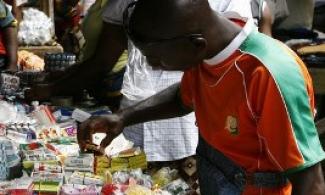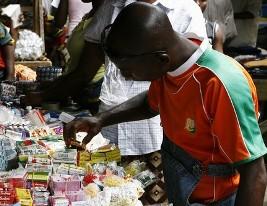
The United Nations Office on Drugs and Crime (UNODC) has called on the Nigerian government to arrest the increasingly widespread use of pharmaceutical drugs among the country's youths.
The United Nations Office on Drugs and Crime (UNODC) has called on the Nigerian government to arrest the increasingly widespread use of pharmaceutical drugs among the country's youths. The call was made in a memorandum sent to the National Assembly. Dated 26 March. The memo said available evidence shows that Tramadol and Codeine are the most abused pharmaceutical substances.
According to the UNODC, reported cases and anecdotal evidence indicate a steady rise in the non-medical use of pharmaceutical preparations among Nigerian youths. The full range of the problem is not yet known because there is yet no statistical data on the trend.
The UNODC disclosed that along with the Federal Ministry of Health and other national partners it conducted a National Drug Use Survey between 2016 and 2017 to establish by evidence what the actual situation of drug use in the country is. The report of the survey, funded by the European Union (EU), will be released before the end of this year.
"The result of the National Drug Use Survey will assist policymakers in identifying which drugs are used, the geography of use and the prevalence of drug use. With this evidence, policymakers will be better able to make informed and targeted interventions to address issues identified by the study," said the UNODC.
It explained that reports from drug regulatory agencies and media indicate that Codeine and Tramadol are the most abused substances. Quoting the Nigerian Epidemiological Network on Drug Use (NENDU) of the patients who entered treatment for opioid use, UNODC said 69% were using Tramadol and 21% were using Codeine.
"These drugs are reported to be abused for their narcotic effects and among the so-called 'legal highs', as they are still legally authorized for the medical use in Nigeria. These two drugs are also not under the international control, which is monitored by the International Narcotics Control Board," said UNODC.
It added that this is supported by evidence of significant seizures of Tramadol at seaports and warehouses by drug control agencies as well as by similar agencies in Ghana and Niger.
It noted the the Nigerian government has expressed concerns over the abuse of codeine and tramadol, including at the Senate Roundtable on Drug Abuse in December 2017, in Kano.
The UNODC, however, advised the Nigerian government that despite concerns about abuse, it should consider medical needs like clinical pain treatment requirements of Nigerians. These, explained the UNODC, include cancer-related pains and non-cancer related pains such as osteoarthritis, chronic back pain, neuropathic pain, fibromyalgia.
According to available data, added UNODC, there is an undersupply of pain medication to the country.
"Therefore, there is a need to strike a balance between government policy providing for adequate access to pain medication and stricter controls of pain medication including codeine and Tramadol," advised the UNODC.
It urged the Nigerian government to carry out a cost-benefit analysis before stiffening controls on licit pain medications being diverted and used for non-medical purposes. Such an analysis, it explained, must consider persons requiring access to pain medication, availability of alternative pain medication of the same classification, cost of the available alternative pain medication and the possibility of misuse the available alternative.
In addition, the analysis should consider the potential of creating underground markets if legitimate access to pain medication is denied and the related organized crime that may result to feed such underground markets; scientific quantification and estimates of the pain medication requirements of the country; adequacy of the current regulations for the monitoring and control of the distribution of pain medication; as well as adequacy of the resourcing and funding of regulatory agencies to carry out routine and non-routine inspection and monitoring of legitimate distribution chains and outlets of pain medication.
UNODC stated that the country already a robust legal framework for the control of pharmaceutical narcotic drugs through the National Agency for Food and Drug Administration and Control Act, which created the National Agency for Food and Drug Administration and Control (NAFDAC) and defines its mandates.
The mandates include to “undertake measures to ensure the use of narcotic drugs and psychotropic substances are limited to medical and scientific purposes” and “collaborate with the National Drug Law Enforcement Agency in measures to eradicate drug abuse in Nigeria”, provisions that empower NAFDAC to ensure the use of pharmaceutical narcotics solely for medical purposes.
The UNODC also noted that the Counterfeit and Fake Drugs and Unwholesome Processed Foods (Miscellaneous Provisions) Act provides for the prohibition of the display and sale of drugs in unlicensed places, establishment of a Federal Task Force, chaired by NAFDAC, to coordinate the activities of State Task Forces in implementing its provisions and establishment of State Task Forces to among other things inspect premises where drugs are sold, inspect registers for the purposes of monitoring legitimate distributions of drugs and minimizing diversion of drugs.
The Act equally provides for the establishment of a specialized Police Force Squad to assist the Federal Task Force in the enforcement of its provisions.
"These provisions clearly set out the required legislative and institutional frameworks to address the challenges of the diversion of pharmaceutical narcotics to non-medical uses. The only challenge seems to be in the implementation of these provisions," said UNODC.
As part of its recommendations, the UNODC said the Nigerian government should gather data on drug-use disorders' prevalence and the accessibility and utilization of treatment; invest in ensuring treatment and rehabilitation are evidence-based; and allocate sufficient resources to treatment and rehabilitation, the two crucial components of demand reduction.
It equally recommended that the government should pay particular attention to special population groups, share nationally and internationally best practices and build capacity as well as stimulate research into new interventions.
The UNODC also recommended that the Nigerian government should use the results of the National Drug Use Survey when released, as evidence to drive its policymaking; make available adequate resources to the drug regulatory authorities, provide adequate legislative oversight over drug regulatory authorities and encourage the drug regulatory authorities to make regulations requiring all manufacturers and marketers of pharmaceutical narcotics to print labels warning users of the addictive nature and other medical side effects of the drugs.
"These messages should be field- tested to ensure that they effectively communicate the required message," said UNODC.
It equally recommended that the Nigerian government should promote a nationwide campaign to sensitize the general public and vulnerable segment to the effect of non-medical use of pharmaceutical narcotics, including the possible inclusion of this in school health science curricula.
It suggested that the sensitization messages must be developed using tested messages specifically targeted at parents, teachers and healthcare professionals who serve as role models.
